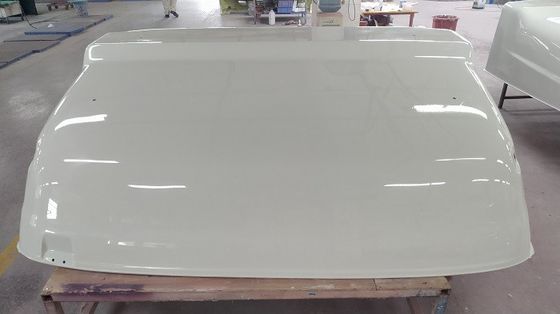Molded fiberglass products in automotive/FRP auto parts/Front bumper
Benefits of the Use of Fiberglass in the Automotive Industry
Fiberglass in Cars
In the modern world, there are many vehicle parts currently being made of fiberglass, especially sports cars where weigh is crucial. Fiberglass is mainly used in the front and rear bumpers, hoods, doors, and casings. Another area where this material is used is the timing belts and V-belts, where glass strings are impregnated with rubber as
reinforcement, due to the high tensile strength of the fiberglass.
Abrasion resistance is also another advantage of the fiberglass, which is why it is used for the production of brake pads and clutches. Clutch disks are reinforced with woven fiberglass to maintain the integrity of the composite material. Anti-abrasive components which are used frequently are Al2O3, SiC and rarely SiC2. These components are added to the liner, the first of the three layers of the composite.
Usually, the liner consists of up to 85 % of resin, where the anti-abrasive chemicals are mixed, and reinforced with few layers of chop strand mat. The high percentage of resin in the upper layer creates a smooth surface and makes it suitable for manufacturing hoods. This helps maintain low aerodynamic loses.
Adding one layer of C-veil makes an even smoother surface. It is easy to add colors (they are special paints for that purpose) in the resin of the upper layer, and a UV-protection, to keep it for a long period.
Trains and Trams
Another field of application of the fiberglass is the manufacturing of parts for trains and trams. The almost entire outer body of some modern trains and city buses is made of composites. Most of the body of the high-speed trains consists of fiberglass. Due to its strength-to-weight ratio, and also smooth upper layer, fiberglass is very suitable for high-speed rail applications, where aerodynamics are utmost important.
This material is used not only for the body but also the interior, shield of carriage equipment under the train etc. Another advantage for this type of vehicles is the fire resistance of the material, which is achieved with additives mixed with the resins. Fire resistance is very important in case a crash occurs since the low spreading of the flames lets the passengers escape quickly.
Wheel tires
Another example of the use of fiberglass in the automotive industry is wheel tires. Fiberglass is used in both radial and bias-ply vehicle tire reinforcement: the glass cords are impregnated with up to 15-30 % resorcinol-formaldehyde-latex resin which coats the individual glass filaments.
Fiberglass was first used as a belt in a belted-bias tire with a nylon carcass. It reinforces the crown region of the tire which, in turn, increases the trade life by about 1.5 times compared to a conventional bias tire. Instead of the conventional bias-ply and steel reinforced belted-bias tire, the fiberglass reinforced tire provides a softer ride, greater resistance to damage, better stability, lower reinforcement cost and a good total performance in long distance driving. All fiberglass products used for the reinforcement of rubber and elastomers are treated in resorcinol-formaldehyde-latex resin.

Specifications:
Key Specifications/Special Features:
1st:Mould treatment:
Polish: Mould must be polished before production which will guarantee the good and solidified surface
Clean: Special detergent are used to get the dust away from the mould which will make no dark markings in the
gel coat surface.
Release agent: This will be brushed on the mould to make ejection easily.
2nd Fiberglass and resin:
Gel coat: The color of products is decided by the gel coat,with thickness of about 0.3-0.5mm. UV resistant can
be added.
Surface mat: This is to avoid the air bubble on the surface, and also make fiberglass mat invisible from the finished
surface.
Fiberglass mat: Normally we use 300g/m2 (0.6mm thickness) and 450g/m2 (0.9mm thickness). According to your
requests on the thickness and strength, we will calculate how many layers of fiberglass mat should be used.
3rd
Solidify: The time required for solidifying depends on thickness and weather condition.Normally 24 hours for one
piece to solidify to avoid any deformation after demoulding.
Demould: After solidified, the product will be demoulded
Cut and trim: We will mark the trim line and hole positions on the mould,then trim according to the marks to
gaurantee the mounting dimensions
4th Adhesion: Professional mould and Temperature and worker
5th Surface treatment :
6th Painting
7th Package Solution:
Our principle: Safe and economical
We choose economical packaging on condition that there will be no damage during transportation.Shipping: We are very glad to get the freight cost information for you
as we have long term cooperated forwarder company.

Primary Competitive Advantages:
Brand-name Parts
Country of Origin
Distributorships Offered
Experienced Staff
Green Product
Guarantee/Warranty
Packaging
Price
Product Features
Product Performance
Prompt Delivery
Quality Approvals
Reputation
Service
Small Orders Accepted

Tag Words:
The FRP products have the following advantages:
Corrosion resistance, good impact toughness, high strength, low mold cost, easy operation, short development cycle, etc. At the same time, it can achieve any complex form of high quality surface, which is very suitable for the manufacture of bus body and interior. Including new product development.
FRP is widely used in large internal and external coverings, such as: canopy, front and rear, luggage compartment door, bumper, instrument panel, air duct, interior trim and so on. The adoption of FRP increases the corrosion resistance, sound insulation and heat insulation of the vehicle body, and enables the passenger car to be lighter in weight, which can save a lot of energy.

 Your message must be between 20-3,000 characters!
Your message must be between 20-3,000 characters! Please check your E-mail!
Please check your E-mail!  Your message must be between 20-3,000 characters!
Your message must be between 20-3,000 characters! Please check your E-mail!
Please check your E-mail! 








